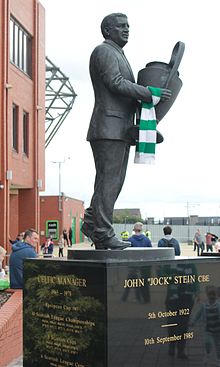Jock Stein
Stein started his managerial career in 1960 with Dunfermline, where he won the Scottish Cup in 1961 and achieved some notable results in European football.
[citation needed] Celtic finished eighth in the Scottish League during 1952–53 and were only invited to the pan-British Coronation Cup tournament due to their large support base.
[22] It was not a happy experience for Stein, as his direct opponent, Bedford Jezzard, scored two goals as The Football League XI won 4–0 at Stamford Bridge.
It was later suggested that Stein was allowed to leave Celtic temporarily with the intention of later appointing him manager, but MacPherson found no evidence for this.
[41] Stein invited Real Madrid for a friendly game in Edinburgh, which Hibernian won 2–0 in front of a crowd of 32,000, further boosting his prestige.
[46] Some people claimed with hindsight that he had deliberately allowed Simpson to join Celtic before moving himself, but in fact it was due to a wage dispute.
[58] Stein surprised some observers by signing forward Willie Wallace from Hearts in December, when the team was already scoring freely and had strikers Stevie Chalmers and Joe McBride at his disposal.
He also guided them to a second European Cup final in 1970, knocking out Benfica and Leeds United en route, but they lost to Dutch side Feyenoord in Milan.
During this time Stein's Celtic completed a record of nine consecutive Scottish league championships, equalling a world record held at the time by MTK Budapest and CSKA Sofia[74] This sustained success became routine to the extent that attendance figures fell during the later part of the run, with the decline at Celtic being above the league average.
Davie McParland joined Celtic at this time, replacing Sean Fallon as assistant manager and working under Stein.
[77] McParland took charge of the 'tracksuit' aspects of coaching at Celtic while Stein watched from the touchline, still not fully recovered from the serious car smash he was involved in the year before.
He was allowed to nominate his successor, Billy McNeill, and Stein thought an agreement was in place for him to join the Celtic board of directors.
[85] Attendances at Elland Road were low and Stein apparently missed the pressure of big games against foreign opposition.
However the report ended by quoting Manny Cussins as stating he was "certain Jock Stein is happy at Leeds and will not leave to take the Scottish job".
[85][88] Cussins, who had sacked Brian Clough after just 44 days in charge of Leeds in 1974, refused permission for the Scottish Football Association to speak to Stein.
[85] Stein was first appointed manager of Scotland on a part-time basis in the spring of 1965, taking charge of their attempt to qualify for the 1966 World Cup.
After Willie Ormond resigned as manager of Scotland in May 1977, Stein was approached about replacing him, but confirmed that he intended to remain at Celtic.
[95] He also believed that Scotland had tended to play with too much emotion and naivety, which he wanted to replace with an emphasis on retaining possession of the football.
[96] The Scots' form improved in their successful qualifying campaign for the 1982 FIFA World Cup, finishing top of their group and only losing once.
[97] Scotland travelled to Spain in the summer of 1982 in what would be the only occasion Stein would manage a side at the finals of major international tournament.
Danny McGrain and Kenny Dalglish were surprise omissions, while David Narey, Willie Miller and Steve Archibald came into the side.
Zico equalised just before half-time from a free kick, and then Brazil took control in the second half, scoring three times to send Scotland crashing to a 4–1 defeat.
[103] Stein observed that Scotland "won with style" and singled out winger Davie Cooper along with McStay for the flair they both displayed.
Spain pulled a goal back in the second half, but with 18 minutes remaining Kenny Dalglish dribbled past three Spanish defenders before striking a powerful shot high into the net for Scotland's third.
Stein described the win over Spain as "the most satisfying since I became [Scotland] manager", adding that "we scored three goals against a quality team that came to defend".
[106] Performances and results were more mixed in the later qualifying ties, losing the return match in Spain, going down to a 1–0 defeat against Wales in Glasgow and scraping a narrow 1–0 win over Iceland in Reykjavík.
Stein, who had been in poor health and under intense pressure, suffered a fatal pulmonary edema (fluid build-up in the lungs) at the end of the game – he had stopped taking prescribed medication for heart disease so his match preparations would not be disrupted by the side effects[120][121] – and died shortly afterwards in the stadium's medical room; he was 62 years old.
[124][125][126][127][128] Stein was hugely respected by his peers and a massive influence on the next generation of managers who would follow in his footsteps; such as those who played under him like Billy McNeill, Kenny Dalglish, Graeme Souness, Alex McLeish, Gordon Strachan; and those who worked under him as coaches like Jim McLean, Walter Smith, Craig Brown and in particular Alex Ferguson.
[128] Stein's use of a free–flowing 4–4–2 formation and his relentless, highly offensive strategy with Celtic in the 1967 European Cup final victory over Inter Milan in Lisbon, which saw him overcome Helenio Herrera's highly successful but more defensive–minded catenaccio tactical system, has also retroactively been compared by pundits to the similarly attacking–minded total football philosophy pioneered by Dutch manager Rinus Michels at Ajax during the 1970s.
On 5 March 2011, a greater than lifesize bronze statue of Stein, by the sculptor John McKenna, was unveiled outside Celtic Park.


